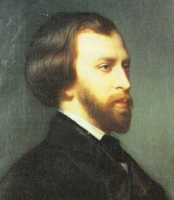| Alfred Louis Charles de Musset-Pathay | |||||||
| 阿尔弗雷德·德·缪塞 | |||||||
阅读缪塞 Alfred de Musset在小说之家的作品!!! 阅读缪塞 Alfred de Musset在诗海的作品!!! | |||||||
缪塞的文学活动是从参加以雨果为首的进步的浪漫主义团体“文社”开始的。他不仅是浪漫派中最有才华的诗人,其戏剧作品也大大促进了法国浪漫主义戏剧运动。他的小说在创建法国浪漫主义心理小说和为近代小说开辟道路上起的作用,也是值得注意的。
缪塞的诗歌真切动人。他的戏剧和小说尽管反映社会生活不够全面,但是抒发个人情感,真实刻画了法国某些阶层的生活及心态,颇具时代色彩。特别是他描写的“世纪病”在今天看来,还可以感觉到当时某些人物的精神面貌,他们的彷徨与苦闷。
他的主要戏剧作品有《罗伦扎西欧》、《反复无常的人》、《巴尔贝林》、《喀尔摩金》等。他的小说有《埃梅林》,《弗烈特立克和贝尔纳莱特》,《提善的儿子》,这三部小说可列入19世纪优秀爱情小说的行列。另一部《世纪儿忏悔录》以其动人的爱情故事和细腻的心理描写而成为缪塞的代表作。
阿尔弗里·缪塞14岁开始写诗,1829年出版第一本诗集《西班牙和意大利故事》19岁的缪塞因写了《西班牙和意大利的故事》而崭露头角。这是一部充满了荒唐故事的诗集。里面有背信弃义,我们看到妻子欺骗丈夫,情妇戏弃情人,还有青春时期的欲望以及老年时期的腐化堕落。在这本诗集中,没有成熟,没有健康,只有一种充满青春活力的、炽热沸腾的、令人难以置信的生命的强度。同时也有对古典主义的清规戒律的嬉笑怒骂。
阿尔弗里·缪塞
1833年,长诗《罗拉》问世,序言的开始就是那著名的憧憬,憧憬往昔的哀悼,憧憬清新而美丽的古希腊,憧憬那具有纯洁渴望和炽热信仰的古代基督教世界。故事的主人公罗拉是巴黎这座放荡的城市中最放荡的青年,他轻视每件事,每个人,虽然并不富有,却贪恋着骄奢淫逸的生活。他厌恶其他一切人,于是把父亲遗留给他的钱分成3份,分别装在3个袋子里。第一袋可供他一年的生活费用,打算钱告罄后开枪自杀。这里是缪塞式的自由:摆脱一切活动、一切职业、一切义务。最后作者描写了罗拉在娼家的自杀。作者顺便也揭示了母亲出卖女儿的勾当。缪塞在这部作品的所表现出的冷漠和目空一切的厌世态度与他的个性及他早期的经历有关,在他青春的初期,缪塞对于人类的信心就已动摇不定了他曾经遭到一个情人的遗弃,一个朋友的背叛。这种上当受骗对他无疑是沉重的打击。从此产生出来的是不信任感、刻毒和轻蔑。
这部诗是缪塞诗歌创作的分水岭,在这之前,缪塞的诗热情明丽,想象丰富,充满了活力和希望。从《罗拉》开始,缪塞的诗风发生了变化,他一反前期的那种乐观精神,诗中开始流露出悲观失望和迷茫不安的心情。这一年,缪塞结识了女作家乔治·桑,从此开始了悲喜交加的感情历程。这段爱情插曲对缪塞的人生和创作影响都极大,缪塞的重要诗篇基本上都是在这一时期写成的,如抒情诗《四夜》、《露西》及《出版法》等。
阿尔弗里·缪塞
1835至1841年写成“四夜组诗”,抒发诗人失去爱情的复杂而丰富的感情,带有悲观色彩。他最著名的抒情诗是《四夜》,即《五月之夜》、《十二月之夜》、《八月之夜》和《十月之夜》。文学史家们都把它们统称为“四夜组诗”。组诗表达了诗人丰富而复杂的感情,从失恋的痛苦到对新生活的希望,从失意的孤独到对慰藉的渴盼,种种感情交织在一起,唱出了凄婉动人的夜莺之歌。《四夜》标志着缪塞抒情诗创作的最高峰,它以流畅优美的诗句呈现出诗人情感高涨时的原始状态,真诚自然地体现了诗人内心深处的复杂感情。在形式上,除了《十二月之夜》以外,其余三篇都采用诗人与缪斯对述的形式,或一问一答,或一唱一和,情感的表现十分细腻。《十二月之夜》则是诗人的独白,诗人通过对自身幻影的反复诘问来渲染他的忏悔、迷茫和渴望之情,极富艺术魅力。《四夜》被列为法国浪漫派抒情诗的杰作。
1836年完成代表作自传性长篇小说《一个世纪儿的忏悔》,描写作者与法国女作家乔治·桑的爱情纠葛,反映19世纪30年代法国青年知识分子的思想危机。另外也创作了许多短篇小说,国内曾翻译出版过《缪塞短篇小说集》。还写有诗剧《酒杯与嘴唇》、长诗《罗拉》、历史剧《洛郎查丘》等,大都描绘对社会现实不满而又找不到出路的个人主义者的悲剧。缪塞于1857年去世,年仅47岁。但早在十几年前,他就几乎不再创作了。后来在他墓碑上刻的是他的主要作品的名称。
阿尔弗里·缪塞 - 戏剧作品
阿尔弗里·缪塞
《罗伦扎西欧》、《反复无常的人》、《巴尔贝林》、《喀尔摩金》等。他的小说有《埃梅林》、《弗烈特立克和贝尔纳莱特》、《提善的儿子》这三部小说可列入19世纪优秀爱情小说的行列。另一部《世纪儿忏悔录》以其动人的爱情故事和细腻的心理描写而成为缪塞的代表作。
《罗伦扎西欧》,罗伦扎西欧是亚历山大这位纵欲的佛罗伦萨大公的堂弟。他天生一副纯朴、敏感而精力充沛的性格。他少怀大志,决心要在世界上打倒暴君统治。为了达到这个目的,他扮演成一个全无心肝的浪子,当了亚历山大的随从,爪牙、出谋划策者。为了减少疑心,他戴上一个软弱、怯懦的肉欲主义者的假面具。然而,这多多少少倒有些弃假成真。于是,他恨透了自己。最后他唯有梦想着用暗杀大公这种单枪匹马、伟大而果敢的行为来洗刷自己一生中的污泥浊水。而且诗人也让他这样把自己洗涮清白的。罗伦佐的性格表现为在可憎的假面具有其高贵性。在他的灵魂里,有一种使他仰不愧于天、俯不作于人的理想因素。他满怀希望,深信伟大行为的赎罪力量。
《反复无常的人》是这些小剧本中最精美的一篇。剧中的男子是一个轻佻的人,但里面的妇女却心地纯正。巴黎女人德·雷利夫人既有教养又聪明伶俐。在她身上作者表现了纯真、清新和自然风度。
在他后来的一些剧作中,缪塞都以歌颂女性的忠贞和纯洁为主题。《巴尔贝林》取材于一个古老的传说,描写的是个理想的忠实妻子。《贝蒂娜》中的同名主人公却是一个坚强、勇敢、心肠温柔和精神高贵的妇女。短剧《喀尔摩金》也是表现坚贞、热烈、虔诚的爱情。
阿尔弗里·缪塞 - 小说作品
阿尔弗里·缪塞
《埃梅林》,《弗烈特立克和贝尔纳莱特》,《提善的儿子》,这三部小说可列入19世纪优秀爱情小说的行列。
另一部《一个世纪儿的忏悔》以其动人的爱情故事和细腻的心理描写而成为缪塞的代表作。
《埃梅林》这篇小说是缪塞第一次名符其实的恋爱的产物。一位青年和一位已婚的年轻贵妇陷入热恋爱之中,却没有任何希望激发她对他的兴趣,后来他终于赢得了她的爱情,她向他奉献了自己。接着,他们突然永远分别了。因为她太忠诚,不能欺骗自己的丈夫;而她的情人也由于感情太纤细而不可能再留在她的身旁。《一个世纪儿的忏悔》是自传体小说。其中的皮埃松夫人就是乔治·桑这位贵妇人高度理想化的画像。作者指出拿破仑帝国的崩溃和对拿破仑英雄主义的幻灭。他把这一切归于“世纪病”产生的根源。
阿尔弗里·缪塞 - 文学地位
缪塞的文学活动是从参加以雨果为首的进步的浪漫主义团体“文社”开始的。他不仅是浪漫派中最有才华的诗人,其戏剧作品也大大促进了法国浪漫主义戏剧运动。他的小说在创建法国浪漫主义心理小说和为近代小说开辟道路上起的作用,也是值得注意的。
缪塞的诗歌真切动人。他的戏剧和小说尽管反映社会生活不够全面,但是抒发个人情感,真实刻画了法国某些阶层的生活及心态,颇具时代色彩。特别是他描写的“世纪病”在今天看来,还可以感觉到当时某些人物的精神面貌,他们的彷徨与苦闷。
Musset was born on 11 December 1810 in Paris. His family was upper-class but poor and his father worked in various key government positions, but never gave his son any money. His mother was similarly accomplished, and her role as a society hostess, - for example her drawing-room parties, luncheons, and dinners, held in the Musset residence - left a lasting impression on young Alfred.
Early indications of Musset's boyhood talents were seen by his fondness for acting impromptu mini-plays based upon episodes from old romance stories he had read. Years later, elder brother Paul de Musset would preserve these, and many other details, for posterity, in a biography on his famous younger brother.
Alfred de Musset entered the collège Henri-IV at the age of nine, where in 1827 he won the Latin essay prize in the Concours général. With the help of Paul Foucher, Victor Hugo's brother-in-law, he began to attend, at the age of 17, the Cénacle, the literary salon of Charles Nodier at the Bibliothèque de l'Arsenal. After attempts at careers in medicine (which he gave up owing to a distaste for dissections), law, drawing, English and piano, he became one of the first Romantic writers, with his first collection of poems, Contes d'Espagne et d'Italie (1829, Tales of Spain and Italy). By the time he reached the age of 20, his rising literary fame was already accompanied by a sulphurous reputation fed by his dandy side.
He was the librarian of the French Ministry of the Interior under the July Monarchy. During this time he also involved himself in polemics during the Rhine crisis of 1840, caused by the French prime minister Adolphe Thiers, who as Minister of the Interior had been Musset's superior. Thiers had demanded that France should own the left bank of the Rhine (described as France's "natural boundary"), as it had under Napoleon, despite the territory's German population. These demands were rejected by German songs and poems, including Nikolaus Becker's Rheinlied, which contained the verse: "Sie sollen ihn nicht haben, den freien, deutschen Rhein..." (They shall not have it, the free, German Rhine). Musset answered to this with a poem of his own: "Nous l'avons eu, votre Rhin allemand" (We've had it, your German Rhine).
The tale of his celebrated love affair with George Sand, which lasted from 1833 to 1835, is told from his point of view in his autobiographical novel, La Confession d'un Enfant du Siècle (The Confession of a Child of the Age, made into a film, Children of the Century), and from her point of view in her Elle et lui. Musset's Nuits (1835–1837, Nights) trace his emotional upheaval of his love for George Sand, from early despair to final resignation. He is also believed to be the author of Gamiani, or Two Nights of Excess (1833), a lesbian erotic novel, also believed to be modeled on George Sand.
Tomb of Alfred de Musset in Père Lachaise Cemetery
Musset was dismissed from his post as librarian by the new minister Ledru-Rollin after the revolution of 1848. He was however appointed librarian of the Ministry of Public Instruction in 1853.
Musset received the Légion d'honneur on 24 April 1845, at the same time as Balzac, and was elected to the Académie française in 1852 (after two failures to do so in 1848 and 1850).
Alfred de Musset died in his sleep on 2 May 1857. The cause was heart failure, the combination of alcoholism and a longstanding aortic insufficiency. One symptom that had been noticed by his brother was a bobbing of the head as a result of the amplification of the pulse; this was later called Musset's sign. He was buried in Père Lachaise Cemetery in Paris.
Reception
The French poet Arthur Rimbaud was highly critical of Musset's work. Rimbaud wrote in his Letters of a Seer (Lettres du Voyant) that Musset did not accomplish anything because he "closed his eyes" before the visions. (Lettre à Paul Demeny, mai 1871)
Director Jean Renoir's La règle du jeu was inspired by Musset's play, Les Caprices de Marianne.
Henri Gervex's 1878 painting Rolla was based on a poem by de Musset. It was rejected by the jury of the Salon de Paris for immorality, since it depicted a scene from the poem of a naked prostitute after having sex with her client - but the controversy helped Gervex's career.
Music
Lorenzaccio, which takes place in Medici's Florence, was set to music by the musician Sylvano Bussotti in 1972.
Works
Poetry
Contes d'Espagne et d'Italie, 1829
Un Spectacle dans un fauteuil, 1832
Poésies complètes, 1840
Poésies nouvelles, 1850
Les Nuits (Nuits de mai, d'août, d'octobre, de décembre), 1835–1837
Œuvres posthumes, 1860
Plays
La Nuit vénitienne, 1830
a failure; from this point until 1847, his plays were published but not performed
André del Sarto, 1833
Les Caprices de Marianne, 1833
Lorenzaccio, 1833
Fantasio, 1834
On ne badine pas avec l'amour, 1834
La Quenouille de Barberine, 1835
Le Chandelier, 1835
Il ne faut jurer de rien, 1836
Un Caprice, 1837
first performed in 1847, and a huge success, leading to the performance of other plays
Il faut qu'une porte soit ouverte ou fermée, 1845
On ne saurait penser à tout, 1849
Carmosine, 1850
Bettine, 1851
L'Âne et le Ruisseau, 1855
Novels
La Confession d'un enfant du siècle (The Confession of a Child of the Century, autobiographical), 1836.
Histoire d'un merle blanc (The White Blackbird), 1842.
Secondary Literature
Henri Lefebvre, Musset, 1955
Mimi Pinson
